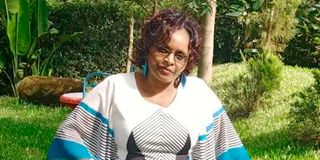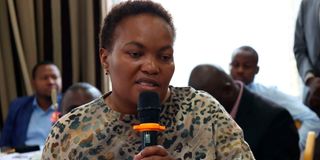Breaking News: Former Lugari MP Cyrus Jirongo dies in a road crash
This is our pain: Mothers of femicide victims speak out

What you need to know:
- When Purity Wangechi went to meet her boyfriend for the last time and Seth Nyakio was found strangled in her Thika home, they became part of Kenya's growing femicide statistics.
- For their mothers, these girls were dreams cut short by brutally .
- The two mothers now navigate a maze of slow courts, uncooperative police, and endless nightmares, with one waiting two years for just two court hearings and the other unable to even get basic information about her daughter's case file.
Purity Wangechi had dreams of becoming a renowned journalist. In 2021, she took her first step toward that goal, enrolling at the Kenya Institute of Mass Communication (KIMC) to study journalism. But just eight months into her studies, those dreams would be violently cut short.
During an interview in Nairobi, her mother Rose Nduta recalls the devastating morning she learned of her daughter's fate. It began with an unexpected call from a friend asking if she had spoken to Purity that day.
"I told her I had not talked to her but had the previous day," Rose recounts.
"She then told me to reach out to her. I did but her phone was not going through. I called my friend and told her I was unable to reach me. She told me that she was coming to my house. I knew something was wrong."

Rose Nduta, mother to Purity Wangechi who was allegedly killed by her boyfriend in May 2021.
Filled with confusion and anxiety, Rose turned to social media, where her worst fears were confirmed. "The first thing I saw were stories about the murder of my daughter. The photos of her naked body in a thicket were all over. I felt like the world had come to an end for me."
The events leading to Purity's death began when she confronted her boyfriend over the phone after discovering he was allegedly involved in criminal activities.
According to police sources, he feigned innocence and pleaded with her to meet and resolve their differences. Eager to solve the conflict, Wangechi left KIMC and went to her boyfriend's house in Kiambu. That was the last time she was seen alive.
Her body, bearing visible stab wounds and strangulation marks, was later discovered in a thicket near Mburiria estate, near Kiambu town.
"It was very painful and traumatising for me," Rose says during the Nairobi interview. "I could not believe that my daughter who I had chatted with the whole of the previous day was dead." She makes a heartfelt appeal to Kenyans on social media, urging them to be mindful of victims' families by not posting pictures of their loved ones' bodies online.

Purity Wangechi in this picture taken months before she was brutally murdered in 2021.
The past two years have been the most difficult of Rose's life. "I was very close to my daughter and we loved each other so much," she shares. "Nightmares of her haunt me up to date. The image of her lifeless body lying in a thicket is always in my mind."
Recently, Rose found a way to honour her daughter's memory. "I attended a graduation ceremony where she was supposed to graduate if she was alive. I felt satisfied by doing that," she says.

Nominated Kirinyaga County MCA Lucy Njeri, speaks at a Nairobi hotel on October 31, 2024, on the tragic death of her 23-year-old daughter, Seth Nyakio, during the County Assemblies Forum meeting.
While Rose grapples with two years of pain, Lucy Njeri's wounds are still fresh. Her only child, Seth Nyakio, a 23-year-old Zetech University graduate, was found murdered at her home in Thika's Biafra area on October 14, 2024. Preliminary police investigations indicate she was strangled, with authorities considering a former boyfriend as a possible suspect.
"My daughter was very loving, charming, and deeply respectful," Njeri says, her voice heavy with emotion during the interview.
"She connected with everyone, and was always my biggest supporter, even during my campaign journey. I'm yet to know why whoever killed her did so as she had her own money."

Seth Nyakio Njeri 23 who was on October 14, 2024 found murdered in Biafra Estate, Thika town.
As a Nominated Member of County Assembly, Njeri had been a strong advocate against gender-based violence. Now, she finds herself transformed by personal tragedy.
"It has affected my productivity at work and I do not know if I will be able to work well again," she admits. "I have become a different person who is now fragile and always fearful. I used to be a bold woman talking about GBV but not anymore. I cry a lot at night and always have nightmares about my daughter, getting sleep has been difficult for me."
Both mothers share another burden beyond their grief: the frustratingly slow pace of justice.
Rose's case has seen only two hearings in two years, with the next scheduled for June 2025.
"Just as the courts normally have special courts to handle election petitions, we are appealing that special courts to handle femicide cases are also set up," she pleads. "This will ensure that these cases are dispensed within the shortest time possible."
For Njeri, the struggle for justice faces different obstacles. Her daughter's suspected killer remains at large, and her attempts to get information from local police have hit wall after wall.
"Even after identifying myself as the mother of Nyakio, many things were being hidden from me," she reveals. "I have never been given the Occurence Book (OB) number through which her murder was reported despite constantly asking for it. The investigations there had a lot of gaps and cover-ups."
Her dissatisfaction led to the homicide department at the Directorate of Criminal Investigations (DCI) headquarters taking over the case, though the main suspect remains at large.
"I believe if the government is serious in apprehending the suspect it can," she states. "I feel like there are some people in the government shielding him from arrest. The DCI should put his picture out there so that the members of the public can help us out."

The suspect in Seth Nyakio's murder. He is yet to be arrested.
These mothers' stories reflect hundreds of similar cases across Kenya, where femicide rates have reached alarming levels. According to the United Nations Office on Drugs and Crime (UNODC) report, Kenya has 725 reported cases of femicide, translating to a rate of 2.66 per 100,000 women. Every week, 47 women are killed in Kenya, with about 75 percent of these killings committed by someone known to the victims.
The crisis has prompted action at multiple levels. President William Ruto recently committed Sh100 million towards the Safe Home, Safe Space Campaign. "I have instructed the criminal justice actors to execute their mandate without delay, holding the perpetrators fully accountable," he declared at a State House meeting.
"Gender desks in police stations must be enhanced and we will introduce gender desks services in hospitals to ensure they receive immediate service."
Seeking solutions
The scale of the crisis is evident at the Nairobi Women Hospital, where CEO Sam Thenya reports their gender violence recovery centres handle an average of 4,000 GBV cases monthly.
"It is a crisis and something definitely needs to be done," Dr Thenya emphasises.
"The economic burden of GBV is enormous. We must speak against this vice that is being perpetuated against women and girls. They are our daughters, wives, sisters and mothers."
Various organisations are mobilising to address the crisis. Winnie Syombua, the JHR Kenya Manager, calls for increased resources: "The government needs to allocate resources to ensure the full implementation of existing GBV laws and policies, including monitoring mechanisms to hold duty-bearers accountable."
Read: Ex-boyfriend of murdered politician's daughter wanted as DCI's Homicide sleuths take over probe
Dan Basira, Deputy Country Representative of UN Women Kenya, emphasises the importance of male engagement: "Male counterparts are defenders of women and girls that are suffering in every community around the world. While the women's and the young women's movements must continue to lead the movement for gender equality, we need to engage boys and young men more intentionally."
Faith Nashipae, a leading boy child advocate, agrees: "We need to look at men as femicide prevention allies. It's paramount that we look at what we are instilling in our boys and also empower them. There is also the need to take the GBV education to schools and also have the church get involved in fighting gender based violence."
Ray of hope
One of the few femicide cases that has seen justice served is that of Monica Kimani, whose killer was sentenced to death in March 2024. For mothers like Rose and Lucy, such outcomes offer a glimmer of hope, even as they continue to navigate their own painful journeys through loss and the quest for justice.
Their stories stand as powerful testimonies to the urgent need for change in how Kenya handles femicide cases. As the nation grapples with this crisis, their daughters' unrealised dreams remind us of the human cost behind every statistic in the ongoing fight against femicide.





